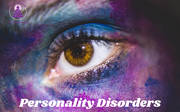
What are Personality Disorders? Can we treat people with personality disorders?
25 Nov 2020- All of us have a unique blend of traits and behaviours termed as our collective personality.
- Personality refers to individual differences in characteristic patterns of thinking, feeling and behaving.
- A personality disorder is a type of mental disorder in which you have a rigid and unhealthy pattern of thinking, functioning and behaving. (A persistent maladaptive behavioural pattern)
- A person with a personality disorder has trouble perceiving and relating to situations and people. This causes significant problems and limitations in relationships, social activities, work and college.
- In some cases, you may not realize that you have a personality disorder because your way of thinking and behaving seems natural to you. And you may blame others for the challenges you face.
- Types of personality disorders are grouped into three clusters, based on similar characteristics and symptoms. Many people with one personality disorder also have signs and symptoms of at least one additional personality disorder. It's not necessary to exhibit all the signs and symptoms listed for a disorder to be diagnosed.
- The pattern of experience and behaviour begins by late adolescence or early adulthood and causes distress or problems in functioning. Without treatment, personality disorders can be long-lasting.
- Diagnosis of a personality disorder requires a mental health professional looking at long-term patterns of functioning and symptoms. Diagnosis is typically made in individuals 18 or older.
- Treatment:Certain types of psychotherapy are effective for treating personality disorders. During psychotherapy, an individual can gain insight and knowledge about the disorder and what is contributing to symptoms, and can talk about thoughts, feelings and behaviours. Psychotherapy can help a person understand the effects of their behaviour on others and learn to manage or cope with symptoms and to reduce behaviours causing problems with functioning and relationships.
- There are no medications specifically to treat personality disorders. However, medication, such as antidepressants, anti-anxiety medication or mood stabilizing medication, may be helpful in treating some symptoms. More severe or long lasting symptoms may require a team approach involving a primary care doctor, a psychiatrist, a psychologist, social worker and family members.
- In addition to actively participating in a treatment plan, some self-care and coping strategies can be helpful for people with personality disorders.
- Remember:No two people are affected the same way by these complex multifactorial disorders and hencethere is no “one-size-fits-all” for treatment. The management needs to be individualized.